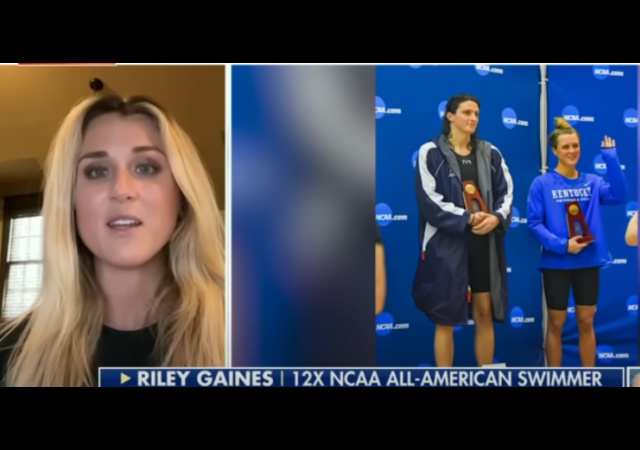Supreme Court Keeps Hold On Biden/Harris Title IX New Rules Giving Boys Access To Girls Sports and Locker Rooms

We have covered the Biden/Harris Department of Education’s attempt to rewrite the rules under Title IX to treat “gender identity” as the equivalent for “sex” under the statute, thereby making gender identity discrimination a federal violation. (You may recall that under a separate employment statute the court, in a Gorsuch opinion held that “on the basis of sex” included sexual orientation and identity.)
But more, the new rules would have had the effect of requiring that schools allowe boys who identified as girls into girls’ sports, bathrooms, and locker rooms. It also would have broadened the definition of harassment Legal Insurrection Foundation filed an opposition to the new rules.
Lower courts, including multiple courts of appeal, have issued injunctions against the new rules. The Biden/Harris administration sought emergency review by SCOTUS. Don’t wish too hard for something, you might get it, and Biden/Harris got the review they wanted only to have the court slap them down, at least for now.
All Justices agreed that the injunctions should stay in place as to the three key provisions, but Gorsuch joined the liberals in dissenting that the non-controversial rule changes could have taken effect. Here are the three key rules (via Sotomayor dissent):
Every Member of the Court agrees respondents are entitled to interim relief as to three provisions of that Rule: 34 CFR §106.10 (2023) (defining sex discrimination), §106.31(a)(2) (prohibiting schools from preventing individuals from accessing certain sex-separated spaces consistent with their gender identity), and §106.2’s definition of hostile environment harassment.
From the Per Curiam (meaning in the name of the Court) Opinion denying the request for a stay of the injunctions:
The Department of Education recently issued a new rule implementing Title IX of the Education Amendments of 1972. The rule newly defined sex discrimination to “includ[e] discrimination on the basis of sex stereotypes, sex characteristics, pregnancy or related conditions, sexual orientation, and gender identity.” 89 Fed. Reg. 33886 (2024).Several States and other parties sought preliminary injunctions against the new rule, arguing among other things that the rule exceeded the bounds of the statutory text enacted by Congress. District Courts in Louisiana and Kentucky agreed with the plaintiffs and preliminarily enjoined enforcement of the rule in the plaintiff States. The Courts of Appeals for the Fifth and Sixth Circuits then declined to stay the injunctions in the interim period while those courts consider the Government’s appeals of the preliminary injunctions.The Government has now filed emergency applications in this Court seeking partial stays of the preliminary injunctions pending resolution of the appeals in the Fifth and Sixth Circuits. The Court denies the Government’s applications.Importantly, all Members of the Court today accept that the plaintiffs were entitled to preliminary injunctive relief as to three provisions of the rule, including the central provision that newly defines sex discrimination to include discrimination on the basis of sexual orientation and gender identity. But the Government argues (and the dissent agrees) that those provisions should be severed and that the other provisions of the new rule should still be permitted to take effect in the interim period while the Government’s appeals of the preliminary injunctions are pending in the Courts of Appeals. The lower courts concluded otherwise because the new definition of sex discrimination is intertwined with and affects many other provisions of the new rule. Those courts therefore concluded, at least at this preliminary stage, that the allegedly unlawful provisions are not readily severable from the remaining provisions. The lower courts also pointed out the difficulty that schools would face in determining how to apply the rule for a temporary period with some provisions in effect and some enjoined.In this emergency posture in this Court, the burden is on the Government as applicant to show, among other things, a likelihood of success on its severability argument and that the equities favor a stay. On this limited record and in its emergency applications, the Government has not provided this Court a sufficient basis to disturb the lower courts’ interim conclusions that the three provisions found likely to be unlawful are intertwined with and affect other provisions of the rule. Nor has the Government adequately identified which particular provisions, if any, are sufficiently independent of the enjoined definitional provision and thus might be able to remain in effect. Moreover, related to the equities, the Sixth Circuit has already expedited its consideration of the case and scheduled oral argument for October. The Court expects that the Courts of Appeals will render their decisions with appropriate dispatch. In light of all of the circumstances, the Court denies the Government’s applications for partial stays.
The issue will come before the court later on full review, but this is a strong indication that a majority of justices, maybe even unanimously, will not force girls to share their sports teams, bathrooms, and locker rooms with boys who identify as girls.
CLICK HERE FOR FULL VERSION OF THIS STORY